In the words of James Moriarty from the BBC series Sherlock: I’m back. Did you miss me? Last week did not go the way I planned at all, to put it mildly. After an emergency room visit, three nights in the hospital, gallons and gallons of IV antibiotics, emergency surgery, and more pain than I even thought was possible, all I have to say is that gallbladders can be real assholes sometimes. I’m very happy to be here right now typing this, in more ways than one.
First up, huge thanks to the one and only Matt Hardigree for covering for me last week. I owe you a drink next time we see each other, sir. On Friday, Matt showed you a couple of vehicles you don’t want to see in the rearview mirror, and you definitely don’t want to see the inside of: ambulances. The ultra-low-mileage Ford Econoline-based rig won handily, despite its higher price and questions about possible rust underneath.
But it’s a bit tactical-looking for my taste, with the flat-black paint and all. I know you can change it, but it’s a lot of work to do so. And I already know my way around a modern Chrysler Hemi, so I think I’d stick with the Rambulance. The dogs seem to like it, and I have come to trust the opinions of dogs.

Now then: If you want to make an old car run more like a new car, a sure-fire way to do it is to swap out its engine for something more modern. But that’s a daunting task that not a lot of us are up to. I briefly looked into swapping the little four-cylinder in my MG for a 3.4-liter V6 from a Camaro, a common swap, but it’s just so much work. It seems to me that if you want an engine-swapped car, a better way to go might be to look for a running and driving project that someone else has grown tired of, or run out of money to complete. Something like one of these two, for instance. Let’s take a look.
1964 Pontiac Catalina – $3,995

Engine/drivetrain: 5.3-liter OHV V8, four-speed manual, RWD
Location: Hillsboro, OR
Odometer reading: unknown
Operational status: “Solid enough to daily drive”
As you’ve probably noticed, we’re big fans of GM’s erstwhile performance division around here. Pontiac kicked off the muscle-car craze under the guidance of automotive antihero John Z. DeLorean, provided the only possible vehicle capable of containing Burt Reynolds in the ’70s, built the only two-seat sports car in the GM stable besides the Corvette, and generally out-cooled all other divisions all the way up until the post-bankruptcy restructuring when it was unceremoniously and shamefully shown the door. No one is sure why that happened, either. Maybe the other divisions were jealous because Pontiacs kept running off with their prom dates.
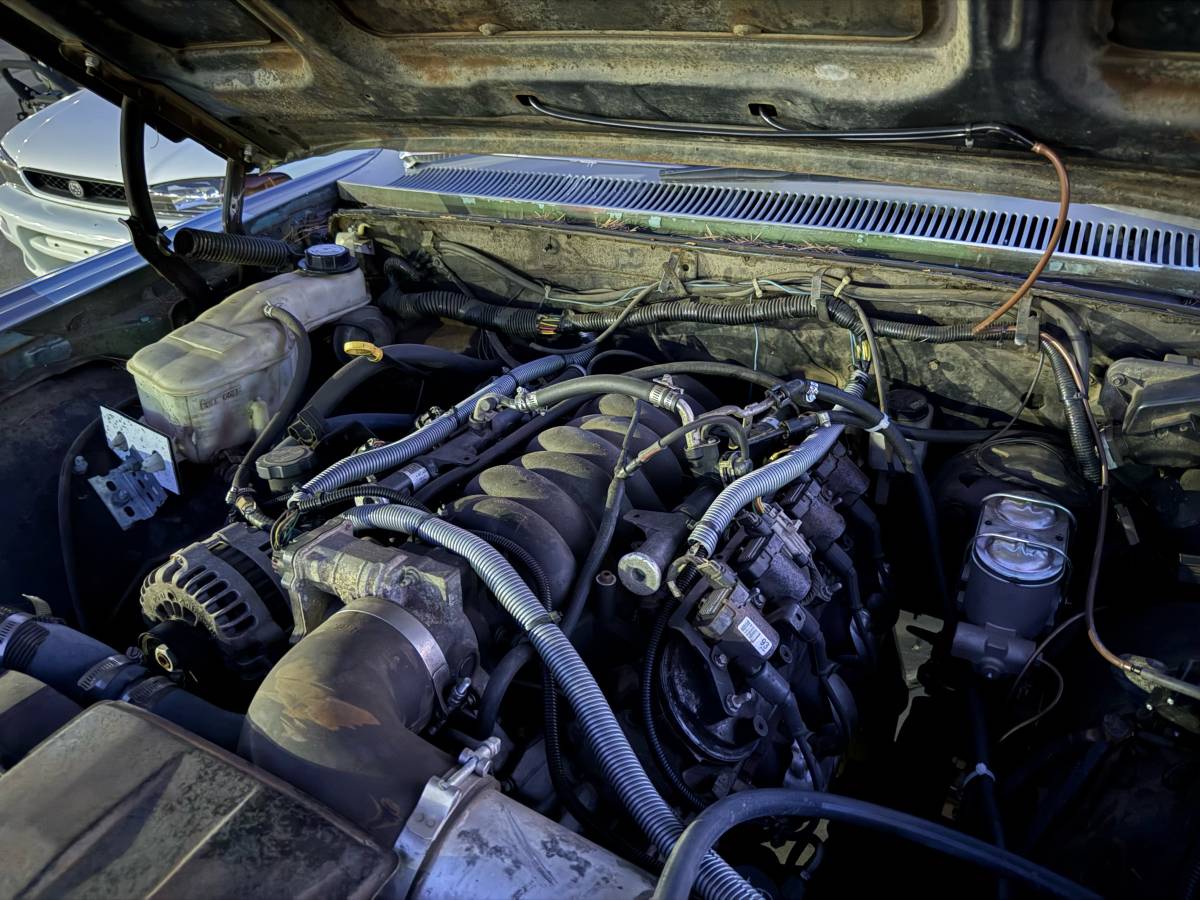
Back when this big Catalina was built, it would have come with Pontiac’s own V8, displacing either 389 or 421 cubic inches. This one, however, has been treated to that most common and effective of modern engine swaps: the LS conversion. It has a 5.3-liter LS small-block, most likely an LM7 or L59 truck engine, widely available in any junkyard. The seller – a dealership, in the interest of full disclosure – says that the conversion was “done right,” and that it runs great. The transmission is a four-speed manual, which they claim came from a mid-90s pickup, but the last four-speed manual available in a GM truck was the granny-low SM465 in 1991, and I doubt it’s one of those. It could be the original transmission, actually; the ’64 Catalina was available with a Muncie four-speed. It looks like some other updates have been made, like a modern dual-circuit power brake master cylinder, and hopefully disc brakes too. I’d have to see it in person, but it sure does look like somebody put some thought into this car.
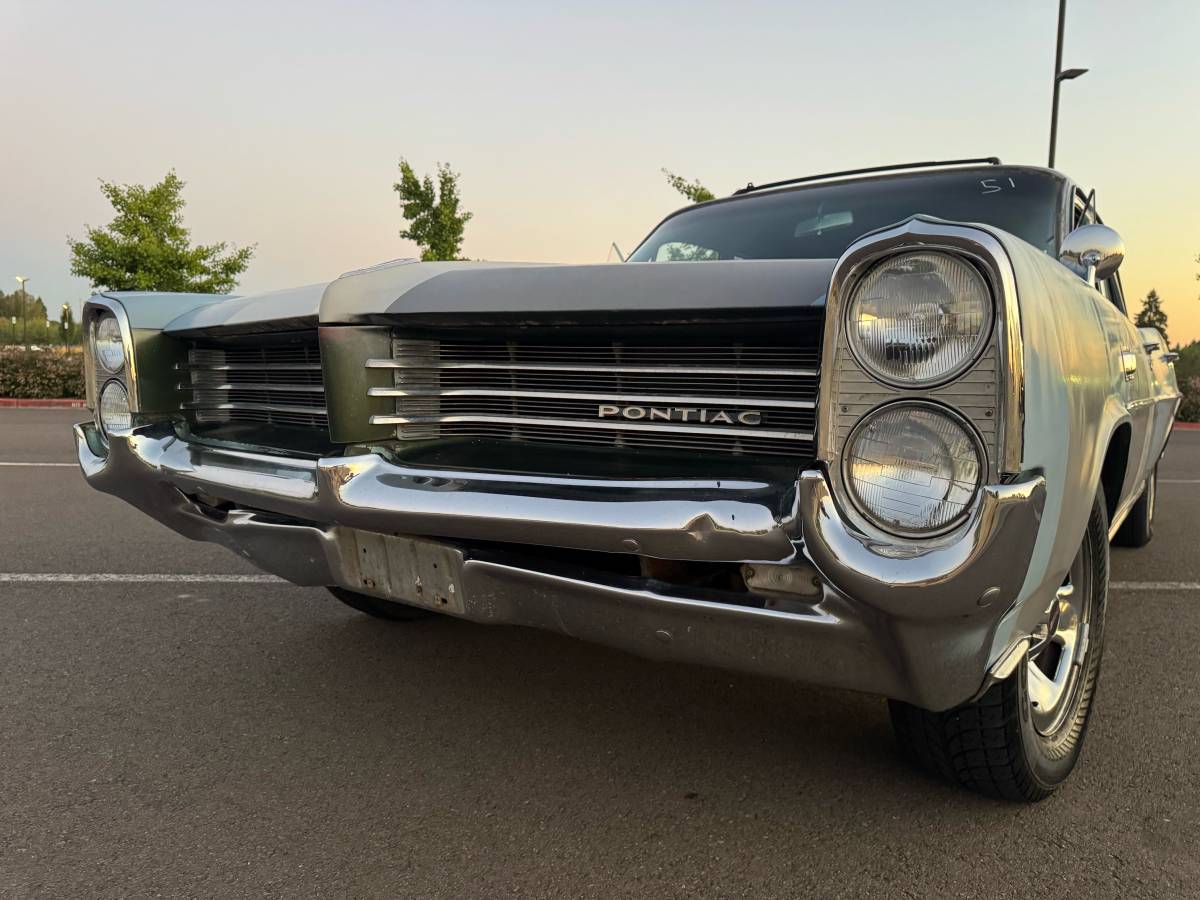
We don’t get any photos of the inside, which makes me think it’s pretty rough. So I’ll just have to show you more of the outside, particularly a ’60s design trait that never failed to look cool: stacked round headlights. Whether it’s on a Pontiac like this, a Ford Galaxie, a Plymouth Fury, or a Buick Riviera – especially with the clamshell covers – there’s just something about two stacks of headlights that makes a car look like it means business. I was confused, however, when I was young and found out that the low beams are on the top and the high beams are on the bottom. Shouldn’t it be the other way around? Actually, I’m still confused by that.
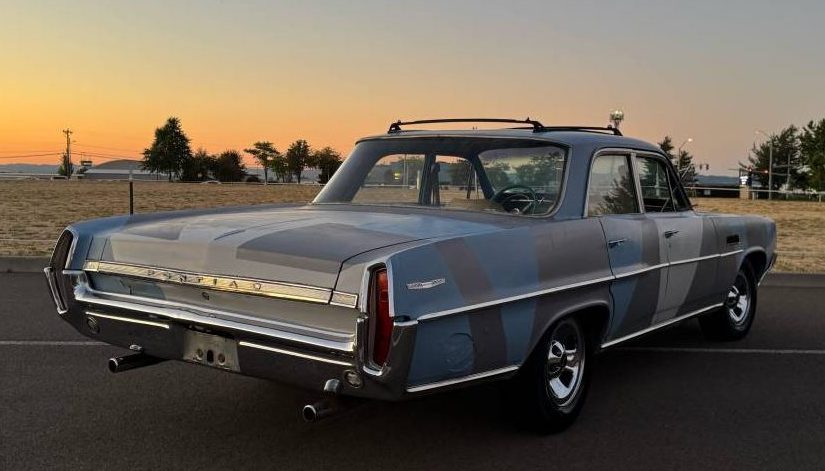
It has an interesting paint job, almost like a World War I lozenge camouflage pattern. I’m not sure if that’s what they were going for, but that’s what it reminds me of. I don’t dislike it, but I wonder if I might get tired of it, and I worry a little about the rust situation under it. The trim is all intact and shiny, though, and it has chrome Chevy Astro wheels on it that suit it well.
1971 Datsun 510 – $4,900

Engine/drivetrain: 3.0-liter OHC V6, five-speed manual, RWD
Location: also Hillsboro, OR
Odometer reading: unknown
Operational status: “Runs and drives” is all it says
Datsun’s 510 sedan, which arrived in the US for the 1968 model year, had a lot going for it: sharp contemporary looks, excellent handling from an independent semi-trailing-arm rear suspension, and everyday practicality. It didn’t have a lot of power; it only had a 1.6-liter L-series four backed by a four-speed manual. But early Datsuns have a Lego-like ability to upgrade parts easily, so a lot of 510s ended up with something more potent eventually. This is a new one on me, though; it has a VG30E V6 and five-speed transmission from a 300ZX under the hood. Mostly under it, anyway; it looks like they had to pound a bulge into the hood for clearance.
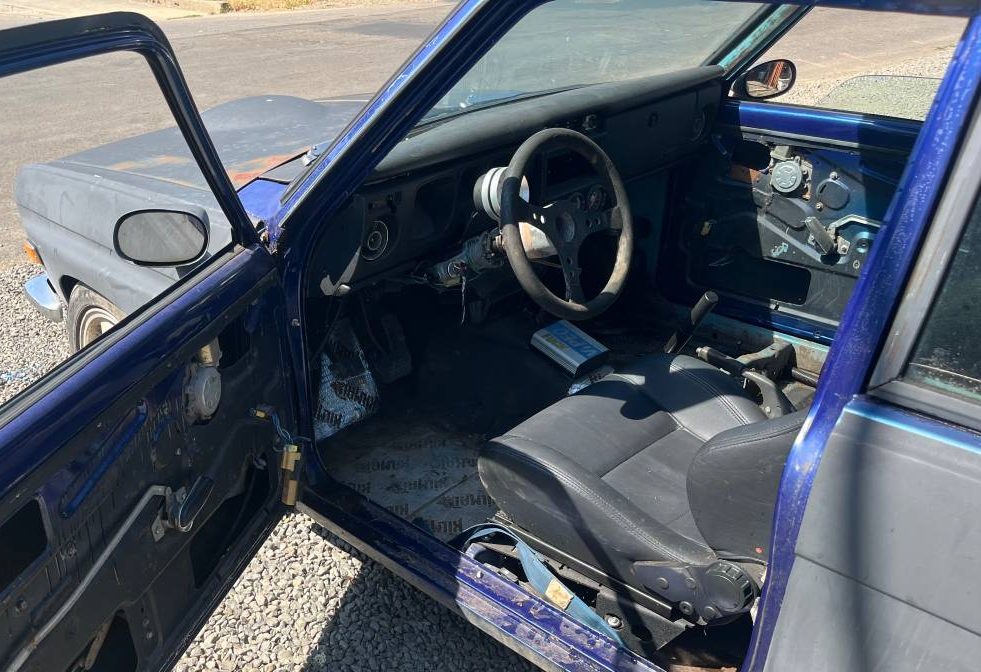
I wish we had a view under the hood, though, because I’m curious how well it was done. The VG30E is fuel-injected, something Nissan hadn’t even dreamed of when this car was built, and it requires an ECU and a whole lot more electrical wiring to make it work. With luck, whoever did the conversion just took the whole wiring harness from the 300ZX and transplanted it into this car, but I fear a mess of splices, crimp connectors, and tape. According to the ad, the car has some other updates, including rear disc brakes, a fuel cell, and rack-and-pinion steering to go along with the added power. They do say it runs and drives, but that could mean a whole range of functionality. If it does run well, I bet it’s quick.
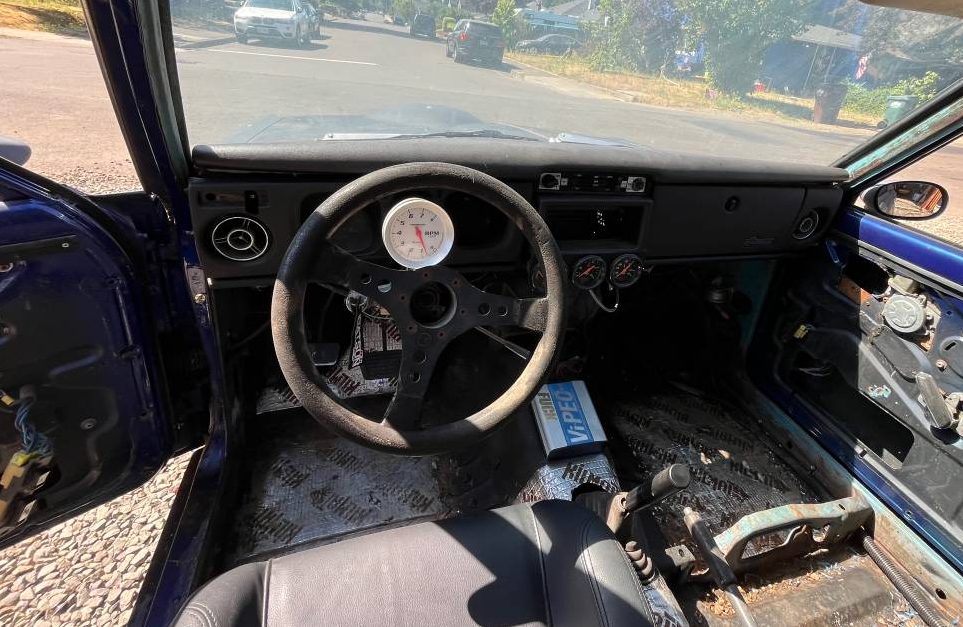
It’s largely gutted inside, with no door panels, carpet, or headliner. I imagine that’s an aftermarket standalone ECU on the transmission tunnel, and a bank of cheap gauges have been stuck on the dash to give you information on the V6’s health. There’s no passenger’s seat, and the driver’s seat has been replaced by a racing-style seat. The presence of lots of stick-on sound insulation and what look like power window switches makes me think someone had a lot of unrealized plans for this car.

Outside, I think it looks worse than it is. There’s some rust, but I don’t think even lifelong West Coast 510s have been rust-free since Simon & Simon went off the air. The floors, rockers, and door sills look all right, and the seller says it’s fine structurally. It may never be a thing of great beauty, but I imagine it will hold together well enough. If you do paint it, though, first figure out a more elegant way of clearancing that hood. That bulge just looks like a welt or a hernia.
Engine swaps aren’t for everyone. Some people prefer the sure knowledge that a car’s Haynes manual actually matches what’s under the hood. I’m typically one of them. But in the case of these, when other distinct improvements have been made along with the new engine, and the drivability is almost certainly improved by more modern engine management, I’m more inclined to look favorably on them. In both of these cars, it sounds like the hard part is done. It’s up to you to drive them home and make them pretty – or not, if you prefer. Which one speaks to you?

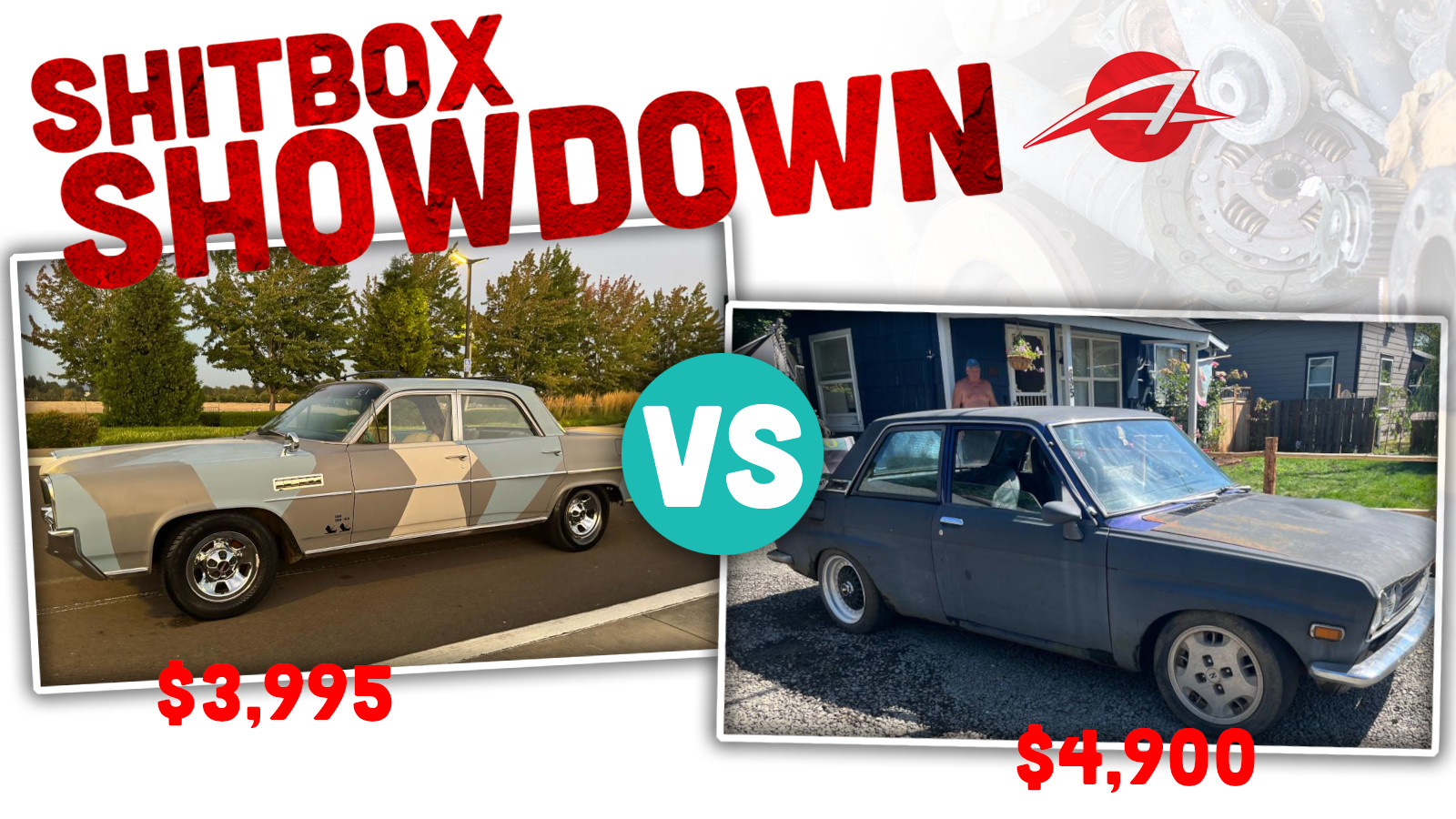




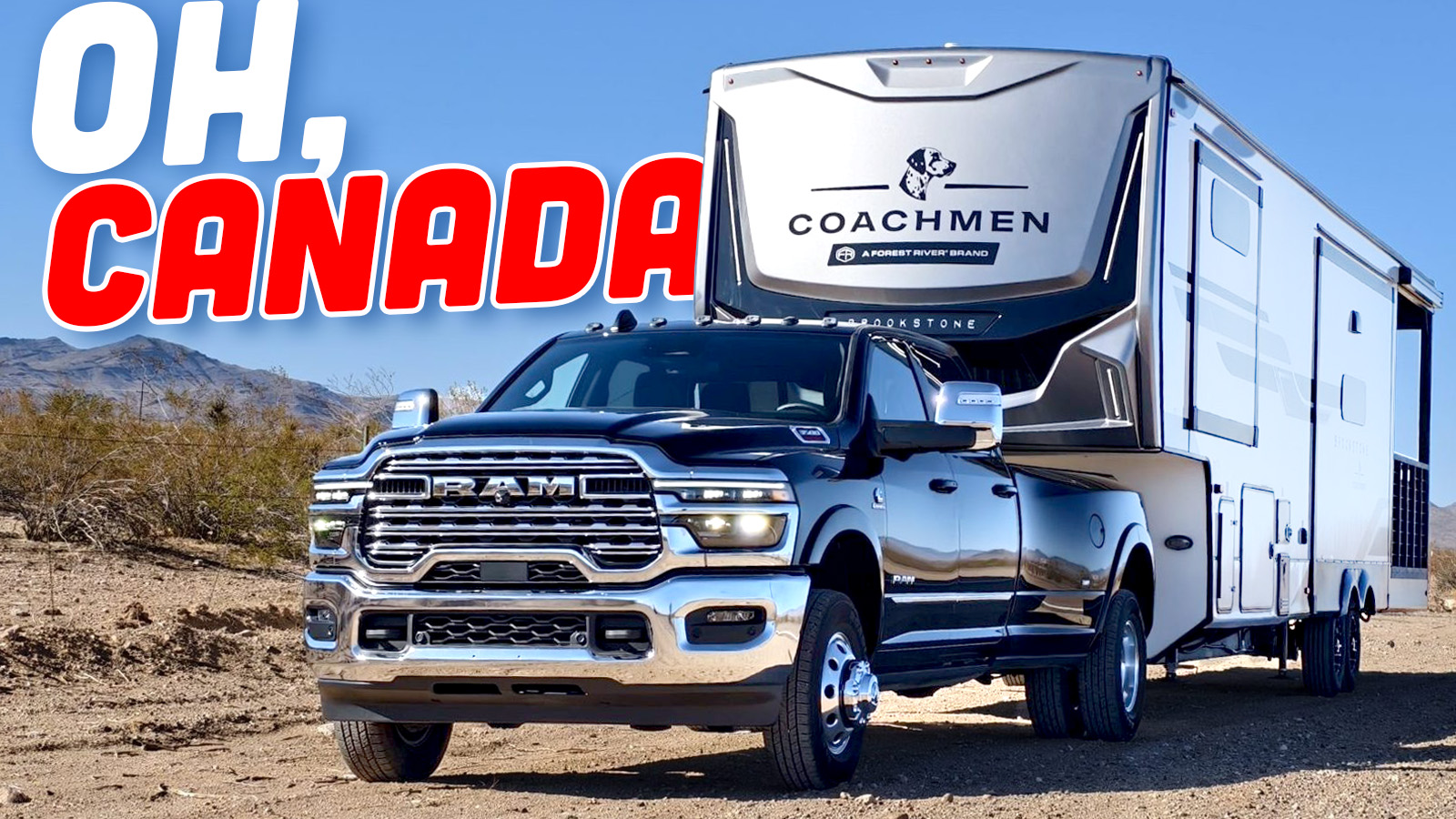
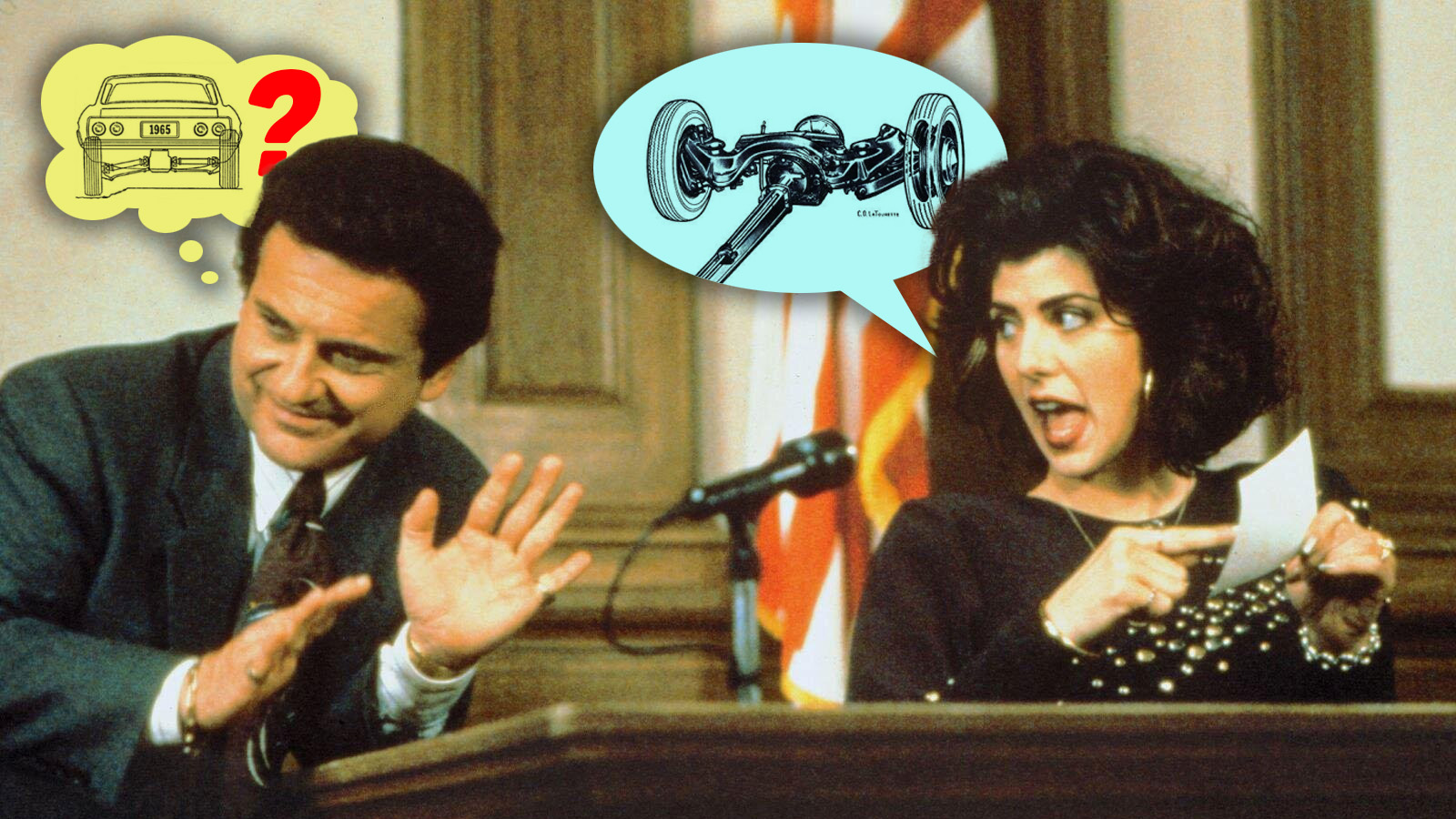
Am I the only one who sees the “FUCK” lettering on the Datsun’s ecu? 🙂
In the abstract, I’d take a 510 over that Pontiac. In this specific case, hell no.
Definitely taking the refurbished old battleship over the mixed rice racer.
I’ll paint over that ugly-ass job on the Pontiac. It’s a handsome car under it. Plus, I’ve wrenched on an LS, and I’d bet good money there is an order of magnitude more space under the hood than the Datsun. Plus, LS with a stick sounds fun. 🙂
Welcome back!
My first car was a 510 (station wagon, sadly). So, I wanted to vote for it, but there is still a LOT of work to be done.
The paint job on the Catalina reminds me of a mud dauber’s nest I found on my patio when I lived in SE Texas. Different shades/sources of mud were used to make said nest.
So, I guess I’d take the Pontiac and budget for a nice repaint.
Dazzle Camo Catalina all the way. I’m not going to rewire a car from scratch, not for grand more. C’mon now.
Low beams on top and high beams at the bottom has been the norm for decades. My square body had stacked headlights with this configuration and so does my 13th gen F150. Low beams need to be angled down so they hit the road effectively and the top position allows for a wider range of adjustments while also being farther away from the front bumper so there is no way they reflect in there.
High beams are a straight beam so if they are at the bottom they can still provide usable light
Back on topic: I was eager to vote Datsun as it’s a 2dr and I like this one better, but the interior is a turn off and I’m not a fan of this engine choice. Timing Belt, Interference engine is at the bottom of my list of engine swaps and being a VG30E means it’s the low output version found on the Z31 generation; a KA24DE would’ve felt like home in this one, bulletproof, less things to worry about and about the same factory output. LS with stacked headlights FTW
So glad you’re doing better. I choose the Wide Track Pontiac.
Well all I have to say about this article is ” Hey I just recently binge watched about 2 seasons of Simon &Simon this weekend”. Still enjoyable if not as convincing as it was to my much younger self. Speaking of which got some Chips viewing in as well. So to sum it up old police/detective series of that age hold up WAY more than either of these two cars.
Why low beams on top – the angle of the light. Low beams need to point down a little. So having them higher up lets the light shine farther forward without blinding people. The high beams are for use when you can’t blind people, so having them lower but pointed straight out is OK.